HOME >> CHINA
Relocation of southwestern Tibetan township gives villagers new opportunities on life
By Li Qiao in Shangri-La Source:Global Times Published: 2019/5/30 16:18:40
○ Special geographical conditions have hindered economic development of Guiwu village
○ Relocation to Shangri-La has helped people in Guiwu pull themselves out of poverty
○ Wider employment opportunities and better infrastructure supported by government have created better lives for Guiwu people
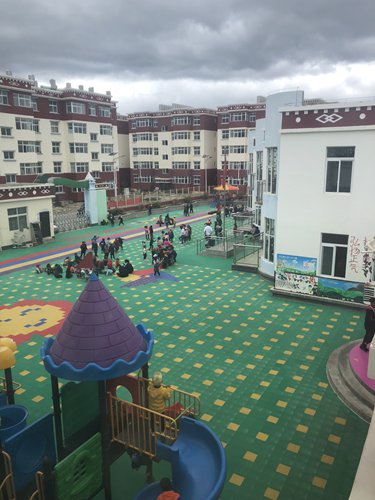
Lobsang, a 24-year-old man from the Tibetan ethnic group in Guiwu village of the Deqen Tibetan Autonomous prefecture, Southwest China's Yunnan Province, was living an unstable and aimless life, making at most 100 yuan ($14.46) per day.
In 2018, Lobsang moved to Shangri-La county, which is 212 kilometers away from Guiwu, together with other villagers under a relocation plan.
Relocation for poverty alleviation refers to programs that relocate residents of areas with poor living conditions to other areas, improving production and living conditions in the resettlement areas, adjusting the economic structure and expanding income sources to help relocated people gradually break free from poverty and improve their financial circumstances, according to a plan released by the National Development and Reform Commission in September, 2016.
China will ensure that all rural poor are lifted out of poverty by 2020 by the country's current standards, according to the report delivered at the 19th National Congress of the Communist Party of China in October 2017.
The Report on the Work of the Government (2019) said that the number of people living in poverty in rural areas has fallen by 13.86 million, and 2.8 million people moved out of poverty-stricken areas in 2018.
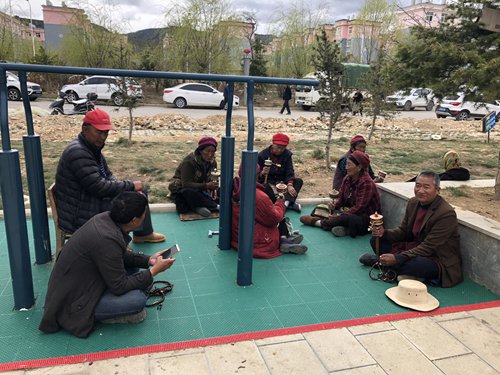
Relocation for poverty alleviation in Guiwu village is helping locals from the Tibetan ethnic group, including Lobsang, to live easier and more hopeful lives.
Tough conditions
Located in northeast Deqen county, Guiwu is the remotest village in northwest Yunnan Province, with an average altitude of 3,300 meters.
Villagers there have to contend with a lack of water and prevalence of high altitude diseases. Depleting resources on the mountain and difficult transportation conditions have hindered the development of Guiwu, Shamba, a local official who is responsible for relocation work in the village, told the Global Times.
Du Fachun, a professor at Yunnan Agricultural University, told the Global Times that relocation for poverty alleviation in Yunnan Province mainly targets those who live in areas with difficult environments such as remote mountainous regions, desert areas, and areas that are rife with endemic disease.
Du is currently studying poverty alleviation in Deqen with the support of the United Nations China Gender Fund.
He explained that these areas have poor infrastructure and are lacking in basic development conditions. The inhabitants generally live a traditional lifestyle characterized by subsistence farming.
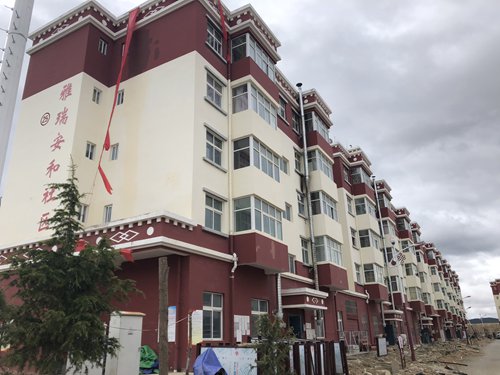
The relocation process in Guiwu lasted around one year. All 810 people in the 132 households that make up Guiwu have moved to Shangri-La county as part of poverty alleviation efforts in October, 2018.
Villagers are provided with apartments that comply with the national standard of 25 square meters per person free of charge, Shamba explained.
He told the Global Times that some poor households had been afraid to move out. Their main concerns were adapting to urban life and a different climate, while unemployment was their biggest worry.
Learning to adapt
The success of relocation for poverty alleviation is not measured by moving people out from poverty-stricken areas, but by helping relocated people adapt well to resettlement areas, Liu Yongfu, director of the State Council Leading Group Office of Poverty Alleviation and Development, said at a press conference for the Second Session of the 13th National People's Congress in March 2019.
Shamba told the Global Times that people without skills in Guiwu were afraid that they could not find jobs and build new lives in the resettlement area after moving down from the mountain, especially those between 45 and 60 years old.
The Guiwu government took full account of the actual needs of poor households and organized training for vocations such as cleaning services, plumbing and cooking.
Dolma, a 57-year-old woman from the Tibetan ethnic group, used to work on the family land on the mountain before relocation. She learned professional cleaning skills such as how to clean windows, and improved her health and safety awareness during the training.
With help from the local government, she was employed as a sanitation worker with an income of 1,800 yuan per month.
After relocation, Dolma is more confident and happier than before, as she can earn money for her family and has more opportunities to communicate with people in her work, her son told the Global Times, as Putonghua is still difficult for Dolma.
Shamba explained that the local government is also planning to provide Putonghua training and work together with more companies to improve the employment situation.
After the relocation of Guiwu, Lobsang attended the culinary training program provided free of charge by the government to help relocated residents gain employment opportunities.
He then decided to run a spicy hot pot restaurant, which had been his dream when he worked in a restaurant previously. He now earns at least 300 yuan per day, just two months after his restaurant opened.
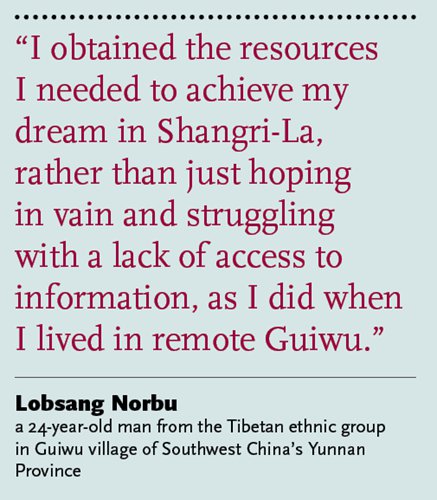
"As well as providing culinary skills training, government officials also helped me with my marketing strategy. I obtained the resources I needed to achieve my dream in Shangri-La, rather than just hoping in vain and struggling with a lack of access to information, as I did when I lived in remote Guiwu," Lobsang said.
Happy lives
In addition to training for better and wider employment opportunities, better education, healthcare and recreational infrastructure at the new resettlement site in Shangri-La provide the basis for a happy life for the Guiwu people, Shamba told the Global Times.
According to the National Development and Reform Commission in March, 2018, poor people who move away from their homes and experience a change in living and working environment often face many psychological difficulties.
The commission said that relocated people's ability to cope with the challenges brought by migration depends not only on their own adaptability, but also on the facilities provided by the resettlement site.
Dorjie, father of a 5-year-old girl, told the Global Times that he can watch her daughter growing up every day, thanks to the kindergarten in their new community which is just 50 meters away from his new apartment.
There was no kindergarten in Guiwu, which meant his daughter had to go to the kindergarten in another village two hours away by motorbike.
Due to the long distance and dangerous mountain road, his daughter could only come back home twice a month, leaving her family anxious.
His daughter has now become more outgoing and optimistic, as urban life broadened her horizons and family companionship strengthened her sense of security after relocating to Shangri-La.
"Relocation not only increases our income but also brings us more happiness in life," Dorjie said.
Shamba told the Global Times that relocation not only benefits the impoverished population, but is also good for the environment.
He explained that 3,053 mu (2.035 square kilometers) of farmland in Guiwu have now been turned into forest.
Du said that the decrease in population due to relocation has alleviated the ecological pressure caused by human activity in the original areas, enhancing their ability to produce goods, and further increasing the income of local residents and relocated farmers.
The dual effects of relocation for poverty alleviation in remote areas promote the construction of an ecological civilization and rural revitalization, Du said, adding that it also provides a good reference for ASEAN countries on poverty reduction.
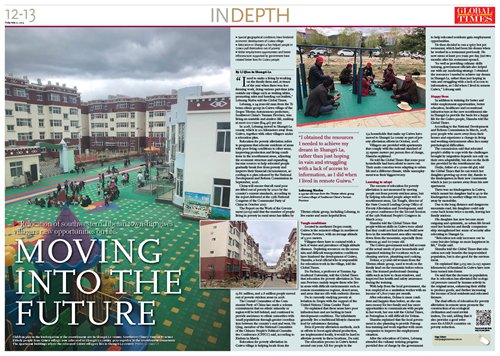
Newspaper headline: Moving into the future
○ Relocation to Shangri-La has helped people in Guiwu pull themselves out of poverty
○ Wider employment opportunities and better infrastructure supported by government have created better lives for Guiwu people

Children play in the kindergarten at the resettlement site in Shangri-La county, Southwest China's Yunnan Province. Photo: Li Qiao/GT
"I used to make a living by working on the family farm and, at times of the year when there was less farming work, doing various part-time jobs outside my village such as waiting tables, promoting sales and handing out leaflets," Lobsang Norbu told the Global Times.Lobsang, a 24-year-old man from the Tibetan ethnic group in Guiwu village of the Deqen Tibetan Autonomous prefecture, Southwest China's Yunnan Province, was living an unstable and aimless life, making at most 100 yuan ($14.46) per day.
In 2018, Lobsang moved to Shangri-La county, which is 212 kilometers away from Guiwu, together with other villagers under a relocation plan.
Relocation for poverty alleviation refers to programs that relocate residents of areas with poor living conditions to other areas, improving production and living conditions in the resettlement areas, adjusting the economic structure and expanding income sources to help relocated people gradually break free from poverty and improve their financial circumstances, according to a plan released by the National Development and Reform Commission in September, 2016.
China will ensure that all rural poor are lifted out of poverty by 2020 by the country's current standards, according to the report delivered at the 19th National Congress of the Communist Party of China in October 2017.
The Report on the Work of the Government (2019) said that the number of people living in poverty in rural areas has fallen by 13.86 million, and 2.8 million people moved out of poverty-stricken areas in 2018.

Elderly people from Guiwu village, now relocated to Shangri-La county, pray together in the resettlement community. Photo: Li Qiao/GT
The Central Committee of the Communist Party of China has made a solemn commitment that no ethnic minority or region will be left behind, and continued to provide assistance to ethnic minorities with small populations through greater coordination between the country's east and west, He Qing, member of the National Committee of the Chinese People's Political Consultative Conference (CPPCC) said, according to Xinhua in March.Relocation for poverty alleviation in Guiwu village is helping locals from the Tibetan ethnic group, including Lobsang, to live easier and more hopeful lives.
Tough conditions
Located in northeast Deqen county, Guiwu is the remotest village in northwest Yunnan Province, with an average altitude of 3,300 meters.
Villagers there have to contend with a lack of water and prevalence of high altitude diseases. Depleting resources on the mountain and difficult transportation conditions have hindered the development of Guiwu, Shamba, a local official who is responsible for relocation work in the village, told the Global Times.
Du Fachun, a professor at Yunnan Agricultural University, told the Global Times that relocation for poverty alleviation in Yunnan Province mainly targets those who live in areas with difficult environments such as remote mountainous regions, desert areas, and areas that are rife with endemic disease.
Du is currently studying poverty alleviation in Deqen with the support of the United Nations China Gender Fund.
He explained that these areas have poor infrastructure and are lacking in basic development conditions. The inhabitants generally live a traditional lifestyle characterized by subsistence farming.

The apartment buildings where the relocated Guiwu villagers live in Shangri-La county. Photo: Li Qiao/GT
Even if poverty alleviation methods, such as efforts to boost agricultural production, are implemented locally, it would be hard to alleviate poverty in these locations, Du said.The relocation process in Guiwu lasted around one year. All 810 people in the 132 households that make up Guiwu have moved to Shangri-La county as part of poverty alleviation efforts in October, 2018.
Villagers are provided with apartments that comply with the national standard of 25 square meters per person free of charge, Shamba explained.
He told the Global Times that some poor households had been afraid to move out. Their main concerns were adapting to urban life and a different climate, while unemployment was their biggest worry.
Learning to adapt
The success of relocation for poverty alleviation is not measured by moving people out from poverty-stricken areas, but by helping relocated people adapt well to resettlement areas, Liu Yongfu, director of the State Council Leading Group Office of Poverty Alleviation and Development, said at a press conference for the Second Session of the 13th National People's Congress in March 2019.
Shamba told the Global Times that people without skills in Guiwu were afraid that they could not find jobs and build new lives in the resettlement area after moving down from the mountain, especially those between 45 and 60 years old.
The Guiwu government took full account of the actual needs of poor households and organized training for vocations such as cleaning services, plumbing and cooking.
Dolma, a 57-year-old woman from the Tibetan ethnic group, used to work on the family land on the mountain before relocation. She learned professional cleaning skills such as how to clean windows, and improved her health and safety awareness during the training.
With help from the local government, she was employed as a sanitation worker with an income of 1,800 yuan per month.
After relocation, Dolma is more confident and happier than before, as she can earn money for her family and has more opportunities to communicate with people in her work, her son told the Global Times, as Putonghua is still difficult for Dolma.
Shamba explained that the local government is also planning to provide Putonghua training and work together with more companies to improve the employment situation.
After the relocation of Guiwu, Lobsang attended the culinary training program provided free of charge by the government to help relocated residents gain employment opportunities.
He then decided to run a spicy hot pot restaurant, which had been his dream when he worked in a restaurant previously. He now earns at least 300 yuan per day, just two months after his restaurant opened.

"As well as providing culinary skills training, government officials also helped me with my marketing strategy. I obtained the resources I needed to achieve my dream in Shangri-La, rather than just hoping in vain and struggling with a lack of access to information, as I did when I lived in remote Guiwu," Lobsang said.
Happy lives
In addition to training for better and wider employment opportunities, better education, healthcare and recreational infrastructure at the new resettlement site in Shangri-La provide the basis for a happy life for the Guiwu people, Shamba told the Global Times.
According to the National Development and Reform Commission in March, 2018, poor people who move away from their homes and experience a change in living and working environment often face many psychological difficulties.
The commission said that relocated people's ability to cope with the challenges brought by migration depends not only on their own adaptability, but also on the facilities provided by the resettlement site.
Dorjie, father of a 5-year-old girl, told the Global Times that he can watch her daughter growing up every day, thanks to the kindergarten in their new community which is just 50 meters away from his new apartment.
There was no kindergarten in Guiwu, which meant his daughter had to go to the kindergarten in another village two hours away by motorbike.
Due to the long distance and dangerous mountain road, his daughter could only come back home twice a month, leaving her family anxious.
His daughter has now become more outgoing and optimistic, as urban life broadened her horizons and family companionship strengthened her sense of security after relocating to Shangri-La.
"Relocation not only increases our income but also brings us more happiness in life," Dorjie said.
Shamba told the Global Times that relocation not only benefits the impoverished population, but is also good for the environment.
He explained that 3,053 mu (2.035 square kilometers) of farmland in Guiwu have now been turned into forest.
Du said that the decrease in population due to relocation has alleviated the ecological pressure caused by human activity in the original areas, enhancing their ability to produce goods, and further increasing the income of local residents and relocated farmers.
The dual effects of relocation for poverty alleviation in remote areas promote the construction of an ecological civilization and rural revitalization, Du said, adding that it also provides a good reference for ASEAN countries on poverty reduction.

Newspaper headline: Moving into the future
RELATED ARTICLES: